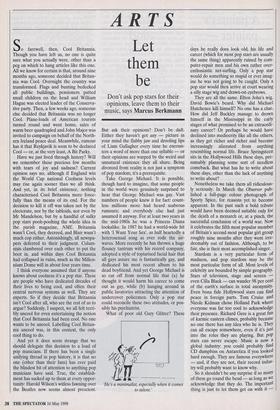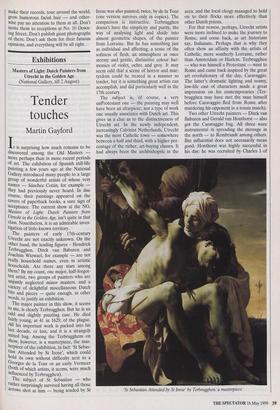ARTS
Let them be
Don't ask pop stars for their opinions, leave them to their music, says Marcus Berkmann So farewell, then, Cool Britannia. Though you have left us, no one is quite sure what you actually were, other than a peg on which to hang articles like this one. All we know for certain is that, around nine months ago, someone decided that Britan- nia was Cool. Overnight the country was transformed. Flags and bunting bedecked all public buildings, pensioners patted small children on the head and William Hague was elected leader of the Conserva- tive party. Then, a few weeks ago, someone else decided that Britannia was no longer Cool. Plane-loads of American tourists turned round and went home, sales of warm beer quadrupled and John Major was invited to campaign on behalf of the North- ern Ireland peace deal. Meanwhile, rumour has it that Reykjavik is soon to be declared Cool — or, at the very least, A Bit Parky.
Have we just lived through history? Will we remember these precious few months with tears of joy and sadness? Current opinion says no, although if England win the World Cup national Coolness levels may rise again sooner than we all think. And yet, in its brief existence, nothing characterised Cool Britannia more force- fully than the means of its end. For the decision to kill it off was taken not by the electorate, nor by the tabloids, nor even by Mr Mandelson, but by a handful of sulky pop stars pooh-poohing the whole idea in the parish magazine, NINE. Britannia wasn't Cool, they decreed, and Blair wasn't much cop either. Astonishingly, all newspa- pers deferred to their judgment. Colum- nists clambered over each other to put the boot in, and within days Cool Britannia had collapsed in ruins, much as the Millen- nium Dome will in about four years time.
I think everyone assumed that if anyone knows about coolness it's a pop star. These are people who have dedicated decades of their lives to being cool, and often their central nervous systems as well. They are experts. So if they decide that Britannia isn't Cool after all, who are the rest of us to argue? Suddenly, I suspect, we all felt terri- bly uncool for even entertaining the notion that Cool Britannia had been cool. No one wants to be uncool. Labelling Cool Britan- nia uncool was, in this context, the only cool thing to do.
And yet it does seem strange that we should delegate this decision to a load of pop musicians. If there has been a single unifying thread in pop history, it is that no one (other than their fans) has ever paid the blindest bit of attention to anything pop musicians have said. True, the establish- ment has sucked up to them at every oppor- tunity: Harold Wilson's witless fawning over the Beatles now seems almost prescient. But ask their opinions? Don't be daft. Either they haven't got any — picture in your mind the flabby jaw and drooling lips of Liam Gallagher every time he encoun- ters a word of more than one syllable — or their opinions are warped by the weird and unnatural existence they all share. Being divorced from reality is not just a symptom of pop stardom, it's a prerequisite.
Take George Michael. It is possible, though hard to imagine, that some people in the world were genuinely surprised to hear that George Michael was gay. Vast numbers of people knew it for fact: count- less millions more had heard scabrous rumours; and everybody else had just assumed it anyway. For at least two years in the mid-1980s he was a Princess Diana lookalike. In 1987 he had a world-wide hit with 'I Want Your Sex', as half heartedly a heterosexual song as ever rode the air- waves. More recently he has thrown a huge flouncy tantrum with his record company, adopted a style of topiarised facial hair that all gays assure me is fantastically gay, and dedicated his most recent album to his dead boyfriend. And yet George Michael is so cut off from normal life that (a) he thought it would harm his career to come out as gay, while (b) hanging around in public lavatories attracting the attention of undercover policemen. Only a pop star could reconcile these two attitudes, or pos- sibly his psychiatrist.
What of poor old Gary Glitter? These He's a minimalist, especially when it comes to talent.' days he really does look old, his life and career (which for most pop stars are usually the same thing) apparently ruined by com- puter-repair men and his own rather over- enthusiastic net-surfing. Only a pop star would do something so stupid or ever imag- ine he was not going to be caught. Only a pop star would then arrive at court wearing a silly stage wig and drawn-on eyebrows.
They are all the same. Elton John's wig. David Bowie's beard. Why did Michael Hutchence kill himself? No one has a clue. How did Jeff Buckley manage to drown himself in the Mississippi in the early stages of what promised to be an extraordi- nary career? Or perhaps he would have declined into mediocrity like all the others, as they get richer and richer and become increasingly alienated from anything resembling normal life. Bruce Springsteen sits in the Hollywood Hills these days, pre- sumably planning some sort of needless comeback. But what has he to write about these days, other than the lack of anything to write about?
Nonetheless we take them all ridiculous- ly seriously. In March the Observer pub- lished a full-page colour photograph of Sporty Spice, for reasons yet to become apparent. In the past such a bold tribute would have been deemed suitable only for the death of a monarch or, at a pinch, the successful conclusion of a world war. Now it celebrates the fifth most popular member of Britain's second most popular girl group roughly nine months after they went irre- deemably out of fashion. Although, to be fair, she is their most accomplished singer. Stardom is a very particular form of madness, and pop stardom may be the most particular form of all. Most levels of celebrity are bounded by simple geography. Stars of television, stage and screen even Cilia Black — can wander 98 per cent of the earth's surface in total anonymity. Even bona fide Hollywood stars can find peace in foreign parts. Tom Cruise and Nicole Kidman chose Holland Park where everyone was far too cool to acknowledge their presence. Richard Gere is a great fan of karmic eastern climes, probably because no one there has any idea who he is. They can all escape somewhere, even if it's just into the roles they are playing. But pop stars can never escape. Music is now a global industry: you could probably find CD dumpbins on Antarctica if you looked hard enough. They are famous everywhere — and, if they are not, their record indus- try will probably want to know why. So it shouldn't be any surprise if so many of them go round the bend — as long as we acknowledge that they do. The important thing is just to let them get on with it make their records, tour around the world, grow humorous facial hair — and other- wise pay no attention to them at all. Don't invite them to receptions at No. 10 Down- ing Street. Don't publish giant photographs of them. Don't ask them for their fatuous opinions, and everything will be all right.



























































 Previous page
Previous page